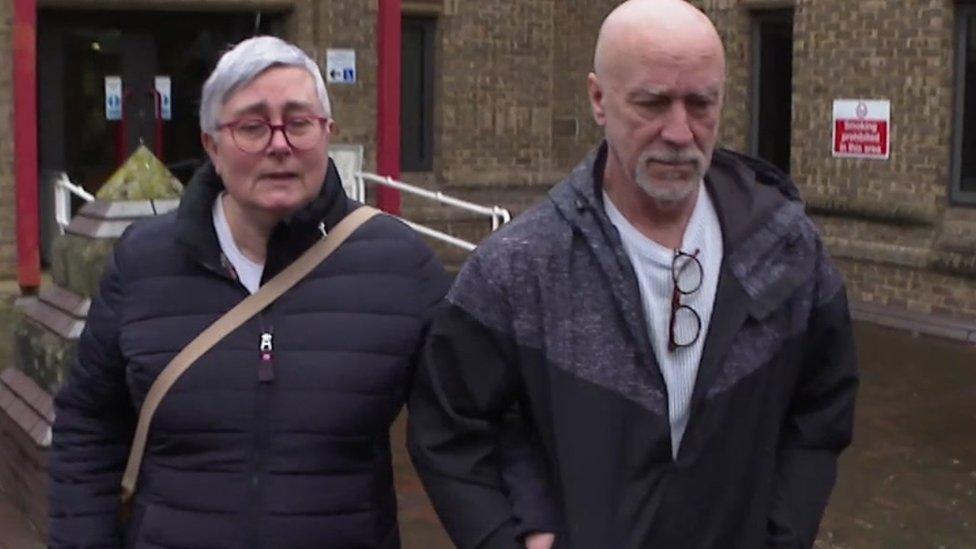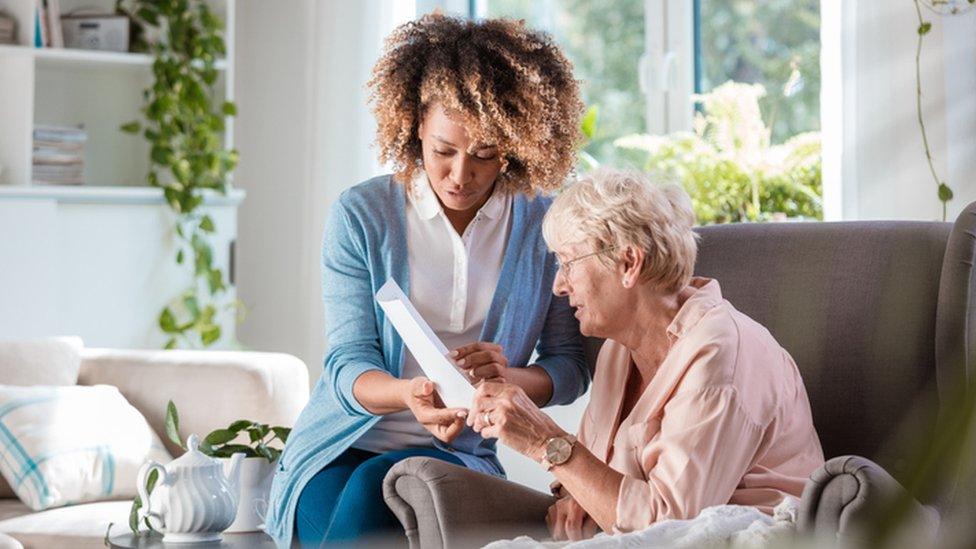DWP take Cheshire woman's inheritance over supermarket job
- Published

Vivienne Groom says she feels she has been "penalised" for caring for her elderly mum
A woman has told of her shock after the government seized £16,000 left to her by her mother because she was overpaid her carer's allowance.
Vivienne Groom was prosecuted for failing to declare her minimum wage Co-op job while also caring for her mum.
Mrs Groom said she was told by a social worker she did not have to tell the Department for Work and Pensions (DWP) about the job.
The DWP said it was "right" it sought to claim back "taxpayers' money".
After taking the job at the store in Tarvin, near Chester, Mrs Groom was told she had to pay back £16,800.
She said she initially agreed a payment plan with the DWP at £30 per month to cover the overpayments, which she received between 2014 and 2019.
However, when the government discovered she stood to inherit £16,000 following the death of her mum, it decided to seize it.
Mrs Groom told the BBC she was devastated by what had happened.
"I followed that lady's rules and I looked after my mum," she said.
"I mean, if people look after their parents they should be paid more money so they don't have to go to work as well.
"I had to go to work. We had bills to pay."
The only way for the DWP to recover the money was to prosecute Mrs Groom, so she was charged with benefit fraud offences.
Without legal representation to assist her, Mrs Groom pleaded guilty and was sentenced to a community order with unpaid work requirements.
She was, however, forced back to court after the DWP initiated proceedings under the Proceeds of Crime Act (POCA), enabling them to ask a judge to order the confiscation of her inheritance.
That order was granted on Wednesday, despite a different judge describing himself as "truly unimpressed" with the DWP's handling of the case during her sentencing hearing.
At that earlier hearing, the Recorder of Chester, judge Steven Everett, told Mrs Groom she was "doing the best you could for your mother".
Speaking outside court on Wednesday, her husband, Geoff, told the BBC his wife had been "penalised for looking after her mum".
The DWP has faced criticism for failing to prevent overpayments, despite having the ability to do so, and allowing the recipients to end up in legal trouble.
Benefit staff get automatic alerts from HM Revenue and Customs (HMRC) if a carer's allowance claimant is earning too much to claim.
'Like hardened criminals'
One DWP employee agreed to speak about Mrs Groom's case on condition of anonymity.
"From 2014 onwards really they had no excuse for having these overpayments carry on for longer than two or three months … if they're investigating all of the alerts", he told BBC North West Tonight.
"DWP should be protecting these people from getting into trouble with their benefits but instead they're persecuting them and treating them like hardened criminals using the Proceeds of Crime Act against them. It's appalling."
Five years ago a report from the House of Commons Work and Pensions Committee accused the DWP of "bullying and harassing" those who had been overpaid.
Margaret Greenwood, Labour MP for Wirral West, told the BBC about 44% of people caring for others for more than 35 hours a week are "living in poverty".
She said to then receive a "large bill" for overpayments they are often unaware of "can be devastating for people".
Last year the DWP revealed it was seeking to recover 145,567 overpayments of Carers Allowance.
An extra 26,500 overpayments were added to that total in the last year alone.
A spokesperson for the DWP said: "We are committed to fairness in the welfare system while protecting the public purse.
"Claimants have a responsibility to inform DWP of any changes in their circumstances that could impact their award, and it is right that we recover taxpayers' money when this has not occurred."

Why not follow BBC Merseyside on Facebook, external, X, external and Instagram, external? You can also send story ideas to northwest.newsonline@bbc.co.uk, external
Related topics
- Published2 August 2019
